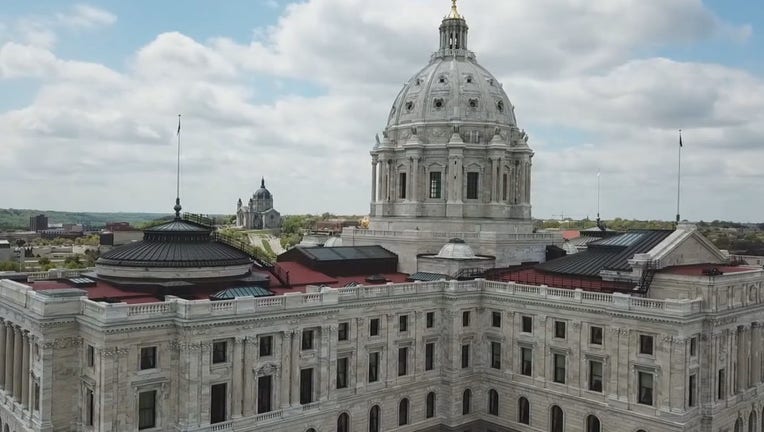Minneapolis crime reshapes police accountability debate sparked by Floyd's death

The exterior of the Minnesota State Capitol. (FOX 9)
MINNEAPOLIS (FOX 9) - Minneapolis's surge in violent crime is casting a shadow over the police accountability debate on the one-year anniversary of George Floyd's death.
Negotiations in the divided state Legislature are barely moving on a series of DFL-proposed police restrictions ahead of a June special session. In the meantime, crime in the state's largest city has led Republicans to reshape the debate.
Minneapolis homicides and nonfatal shootings have more than doubled in 2021 from this point a year ago. The city is hardly alone; major metro areas across the U.S. are dealing with an increase in violent crime.
"What's the solution? More police," Senate Majority Leader Paul Gazelka, R-East Gull Lake, said in a video posted to Twitter on Tuesday, the anniversary of Floyd's death. "It's not reforming police right now. That should not be the message. It's 'Get the police out on the streets.'"
Hours before a memorial event was set to take place at George Floyd Square in south Minneapolis, gunfire sent people running for cover. One person showed up at a hospital with injuries that police did not consider life-threatening, a Minneapolis Police spokesman said. As of midafternoon, no one was in custody.
More than 200 officers, nearly a quarter of the city's force, have left Minneapolis Police over the past year. City officials acknowledged this weekend they cannot deal with the surge on their own and said they were relying on state and federal help.
Mayor Jacob Frey has proposed using federal stimulus money to hire additional police officers. But Frey's critics on City Council are pushing for a major restructuring of the police department instead.
At the same time, lawmakers at the Capitol have been debating additional restrictions on police tactics, including a ban on traffic stops for equipment violations, restrictions on arrest warrants, and changes to a law that shields police officers from being sued in some circumstances. The regular session ended without a deal.
House Public Safety chairman Carlos Mariani said the violent crime did threaten to overshadow the police debate.
"I think it does, but I also want to expand the conversation," Mariani, DFL-St. Paul, said in an interview. "First of all, it's undeniable. It's not just Minneapolis. It's everywhere. It's a national trend."
The COVID-19 pandemic has caused societal stress that's playing out with violence in major cities, Mariani said. He contended that there are three keys to addressing it: funding police, providing additional police oversight, and enhancing community-based violence intervention programs.
Republicans are too focused on Minneapolis, Mariani said.
"We just get nowhere by arguing it's Minneapolis's problem and therefore, 'Stop being bad, Minneapolis, and this will all go away,'" he said.
The Democratic-controlled House and Republican-led Senate struck a more limited deal on police accountability last summer in the aftermath of Floyd's death, banning chokeholds and imposing a new use of force standard. Democrats' calls for additional restrictions grew louder after the April police killing of Daunte Wright in Brooklyn Center.
In recent weeks, the community reeled from a spike in crime. Three children ages 10 and under were shot in a three-week period, including a 6-year-old girl who later died.
Senate Judiciary chairman Warren Limmer said the violence had become a "backdrop" for negotiations over police accountability.
"All of these other things kind of pale in comparison when you start seeing citizens getting shot and killed on the streets or their backyard or a little girl on a trampoline," Limmer, R-Maple Grove, said in an interview.
Limmer and Mariani said they had traded offers in recent days over police legislation but said they hadn't reached any deals on the major issues.
House Speaker Melissa Hortman said lawmakers have work to do ahead of the June special session.
"We took the first steps in passing police reforms last year, but the calls for justice and a better future are loud and clear, and we have a long road ahead of us to deliver systemic change," Hortman, DFL-Brooklyn Park, said in a statement.

